|
Summary:
Every 120 years or so a dark spot glides across the Sun. Small,
inky-black, almost perfectly circular, it's no ordinary sunspot.
Not everyone can see it, but some who do get the strangest
feeling, of standing, toes curled in the damp sand, on the
beach of a South Pacific isle.... Get the full
story from Science@NASA.
This
is Page 1 | Page 2
| Page 3 | Page
4 | Page 5 | Page
6 | Page 7 | Page
8
| Page 9
| Page 10
| Page 11
| Page 12
| Page 13
| Page 14
| Page 15
Unless otherwise stated, all images are copyrighted by
the photographers.
|
| |
Photographer, Location |
Images |
Comments |
|
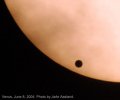
|
Jarle
Aasland,
Stavanger, Norway
Jun. 08, 2004 |
#1 |
Shot
through a hole in the clouds. Nikon D100, 25mm EP, Orion Skyview
Pro 127. |
|

|
Wah!,
Hong Kong
Jun. 08 |
#1,
#2 |
First contact
is prime focus. After first contact
is with 2x barlow.
Details: ToUCam, C8, CGE mount |
|
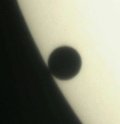
|
Doucats
& Wah!,
Hong Kong
Jun. 08 |
#1 |
Second
contact. Details: ToUCam, C8, CGE mount |
|
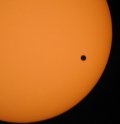
|
Kedar
Bhat, Girish Vaze, Swapneel Kore,
Mulund, Mumbai, India
Jun. 08 |
#1,
#2, #3 |
ETX
90 on LXD-55 Mount, Nikon D100, Prime Focus, 1/200 sec. |
|

|
Parssky.com,
Esfahan city, Iran
Jun. 08 |
#1,
#2, #3 |
Photography info : Digital Camera 3 MG Picxel
, 8 " Telescope |
|
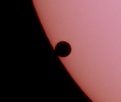
|
Subaru,
Hong Kong
Jun. 08 |
#1 |
Venus
transit second contact, 20040608 05:31:05UT ND3.8 + C5 + Nikon
D70, ISO200, 1/3000 exposure. |
|
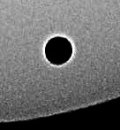
|
Jan
Simons,
Booischot,Belgium
Jun. 08 |
#1,
more |
Used
equipment: Skywatcher Refractor 6' f8 + 32 mm Kelner + Baader
AstroSolar + Nikon Coolpix 5400 ISO 200, 1/2000s exposure |
|
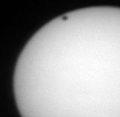
|
Richard
Fusniak,
Cambridge UK, 6.45 am local time
Jun. 08 |
#1 |
A little
bit blurred but this shows what can be done by photographing
a PROJECTED image
1m from 10x50 binoculars. The image disc was 150mm in diameter
on a paper screen. Fuji Finepix 2800 camera. |
|
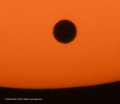
|
Adam
Jesionkiewicz,
Warsaw/Poland
Jun. 08 |
#1,
#2, #3,
more |
Canon
300D, FL2400, ISO200, 1/250 sec. |
back to spaceweather.com
|
|